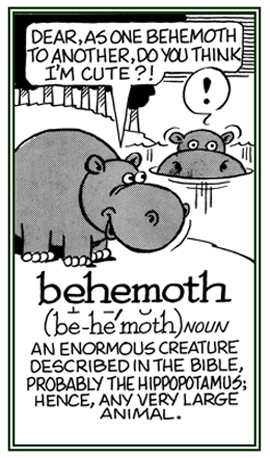You searched for:
“behemoths”
1. Something which or someone who is enormous in size or power: Gerald was such a physical behemoth that he usually wrestled with at least three other opponents at the same time during TV shows, instead of just one, and they were never able to pin him down.
2. An exceptionally important person whose behavior and actions have a significant influence on the actions of other people: Alex was considered by the administers and colleagues of his company to be a behemoth of skills because he was a creator of new products that customers always found essential for their lives.
3. When capitalized, a huge animal or beast, possibly the hippopotamus: For a long time in the past, there were those who considered a Behemoth to be an elephant; others, a hippopotamus, a crocodile, etc.
4. Etymology: from Hebrew, buheemah, singular; buheemoth, plural; expressing the magnitude or extraordinary size and strength of a "beast" or "beasts"; borrowed into Latin behemoth; and then Middle English behemoth, bemoth.

© ALL rights are reserved.
Go to this Word A Day Revisited Index
3. When capitalized, a huge animal or beast, possibly the hippopotamus: For a long time in the past, there were those who considered a Behemoth to be an elephant; others, a hippopotamus, a crocodile, etc.
The Behemoth is described in the Old Testament of the Bible at Job 40:15-16: "Behold, Behemoth, which I made as I made you; he eats grass like an ox. Behold his strength in his loins, and his power in the muscles of his belly."
4. Etymology: from Hebrew, buheemah, singular; buheemoth, plural; expressing the magnitude or extraordinary size and strength of a "beast" or "beasts"; borrowed into Latin behemoth; and then Middle English behemoth, bemoth.
Behemoth, noun, in Hebrew, signifies beasts in general, particularly the larger kind, fit for service. But in the Bible, Job speaks of an animal, which he calls behemoth, and describes its particular properties as large, in chapter 40, verse 15.
Bochart has taken much care to make it appear to be the hippopotamus, or river-horse.
Sanctius thinks it is an ox. The Fathers, suppose the devil to be meant by it.
But we agree with the generality of interpreters, in their opinion, that it is the elephant.

